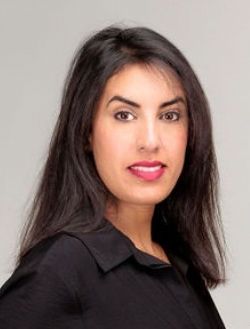Anjam Chaudhary (she/her) serves as the Program Director of Global Diversity, Equity and Inclusion in International Studies and Programs. Her work focuses on developing transformative programs that foster inclusive leadership and cross-cultural communication. Chaudhary also actively contributes to global DEI conversations through her research, conference presentations and consulting engagements. In addition to her role in Global DEI, she leads the Hubert H. Humphrey Fellowship Program and is the Co-Academic Director of the Mandela Washington Fellowship Program.

Reflecting on my personal connection with stories, I see reading as a window into an unknown world — an intimate or collective space for discovery and personal growth. Reading, to me, is an opportunity to connect and bond over a shared story or emotion. I also see storytelling as a gift from the author, offering a unique perspective on life for me to discover, walk through and emerge changed.
I realized very early in life that the simple act of reading can be a powerful tool for resistance, an act of defiance challenging dominant narratives and systemic injustices.
I also understood the transformative impact of reading and education, especially for girls growing up in disadvantaged areas.
Through my family’s travels, I became aware of the privilege I enjoyed in France and later in the U.S., having access to education, resources and platforms to share my voice. But this was a harsh reality check, contrasting with the heartbreaking struggles of girls worldwide, forced to remain silent. This is also why the work of the graffiti artist Shamsia Hassani, who is known for her graffities depicting women with no mouth, resonates with me.
My own journey through higher education was driven by my mother’s words: “Get what I was deprived of. Get an education.” These words guided and inspired me through my doctoral studies while raising my two daughters.
This personal understanding of the challenges women face connects me deeply to Asmaa Jamal Rashed, a Syrian refugee featured in “The Neighborhood Storyteller.” It is also why I feel a responsibility to share her voice (in spaces she might not otherwise reach) and support the work of the film’s director, Alejandra Alcala.
Asmaa spent 10 years in the Zaatari refugee camp in Jordan where she began redefining her identity through storytelling. As the neighborhood storyteller, she uses books as a means of escape for children, a bridge to discuss critical issues in her community and a way to help young girls imagine futures filled with opportunities.
Despite the obstacles, whether from the harsh realities of refugee life or the conservative mindset of her surroundings, her determination to raise a conscious generation of empowered girls keeps her going. Asmaa describes her participation in the film as an opportunity to make her voice heard, especially to girls and women everywhere and from all social backgrounds.
At one point in the film, Asmaa says, “Reading can change you from within.” I believe this to be true. The act of reading empowers and unlocks one’s potential, threatening the very foundations of patriarchy.
“The Neighborhood Storyteller” is not just a film-documentary; it is a piece of art that captures human resilience and the journey from girlhood to womanhood. It is a testament to women like Asmaa, who turn adversity into opportunities for growth. Through her story, we are reminded of the power of education, the importance of storytelling and the resilience of women who refuse to be silenced.
The film also provides a glimpse into a part of the world we do not often see, and it challenges us to think deeply about the systems that are used to control and limit people’s options.
As part of a cross-campus collaboration between International Studies and Programs, MSU Libraries, MSU Culinary Services, Global Studies, Asian Studies and Muslim Studies, I invite the MSU community to a special screening of “The Neighborhood Storyteller” on October 16 in the Brody Auditorium.
Before the screening, we will have the opportunity to engage in a conversation with Asmaa Rashed, the film’s director Alejandra Alcala, and Dr. Rana Dajani, a renowned Palestinian-Jordanian molecular biologist professor and the founder of the global movement We Love Reading.
The event features a Syrian meal inspired by the film, beginning at 4:30 p.m. and runs through 6:30 p.m. Registration is required.